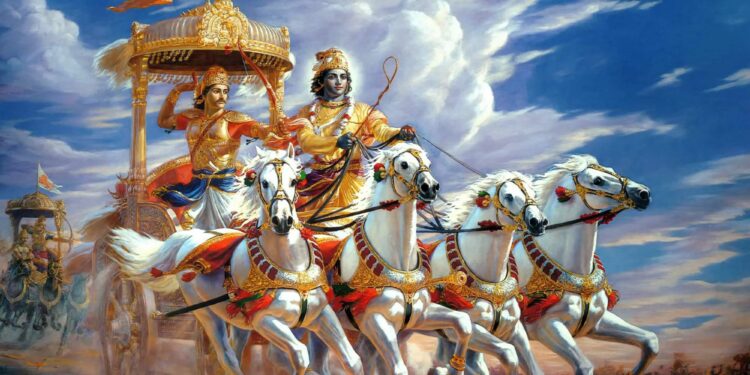TEXT 1
arjuna uvāca
jyāyasī cet karmaṇas te
matā buddhir janārdana
tat kiṁ karmaṇi ghore māṁ
niyojayasi keśava
SYNONYMS
arjunaḥ uvāca—Arjuna said; jyāyasī—better; cet—if; karmaṇaḥ—than fruitive action; te—by You; matā—is considered; buddhiḥ—intelligence; janārdana—O Kṛṣṇa; tat—therefore; kim—why; karmaṇi—in action; ghore—ghastly; mām—me; niyojayasi—You are engaging; keśava—O Kṛṣṇa.
TRANSLATION
Arjuna said: O Janārdana, O Keśava, why do You want to engage me in this ghastly warfare, if You think that intelligence is better than fruitive work?
PURPORT
The Supreme Personality of Godhead Śrī Kṛṣṇa has very elaborately described the constitution of the soul in the previous chapter, with a view to delivering His intimate friend Arjuna from the ocean of material grief. And the path of realization has been recommended: buddhi-yoga, or Kṛṣṇa consciousness. Sometimes Kṛṣṇa consciousness is misunderstood to be inertia, and one with such a misunderstanding often withdraws to a secluded place to become fully Kṛṣṇa conscious by chanting the holy name of Lord Kṛṣṇa. But without being trained in the philosophy of Kṛṣṇa consciousness, it is not advisable to chant the holy name of Kṛṣṇa in a secluded place, where one may acquire only cheap adoration from the innocent public. Arjuna also thought of Kṛṣṇa consciousness or buddhi-yoga, or intelligence in spiritual advancement of knowledge, as something like retirement from active life and the practice of penance and austerity at a secluded place. In other words, he wanted to skillfully avoid the fighting by using Kṛṣṇa consciousness as an excuse. But as a sincere student, he placed the matter before his master and questioned Kṛṣṇa as to his best course of action. In answer, Lord Kṛṣṇa elaborately explained karma-yoga, or work in Kṛṣṇa consciousness, in this Third Chapter.
TEXT 2
vyāmiśreṇeva vākyena
buddhiṁ mohayasīva me
tad ekaṁ vada niścitya
yena śreyo ‘ham āpnuyām
SYNONYMS
vyāmiśreṇa—by equivocal; iva—certainly; vākyena—words; buddhim—intelligence; mohayasi—You are bewildering; iva—certainly; me—my; tat—therefore; ekam—only one; vada—please tell; niścitya—ascertaining; yena—by which; śreyaḥ—real benefit; aham—I; āpnuyām—may have.
TRANSLATION
My intelligence is bewildered by Your equivocal instructions. Therefore, please tell me decisively which will be most beneficial for me.
PURPORT
In the previous chapter, as a prelude to the Bhagavad-gītā, many different paths were explained, such as sāṅkhya-yoga, buddhi-yoga, control of the senses by intelligence, work without fruitive desire, and the position of the neophyte. This was all presented unsystematically. A more organized outline of the path would be necessary for action and understanding. Arjuna, therefore, wanted to clear up these apparently confusing matters so that any common man could accept them without misinterpretation. Although Kṛṣṇa had no intention of confusing Arjuna by any jugglery of words, Arjuna could not follow the process of Kṛṣṇa consciousness—either by inertia or by active service. In other words, by his questions he is clearing the path of Kṛṣṇa consciousness for all students who seriously want to understand the mystery of the Bhagavad-gītā.




















